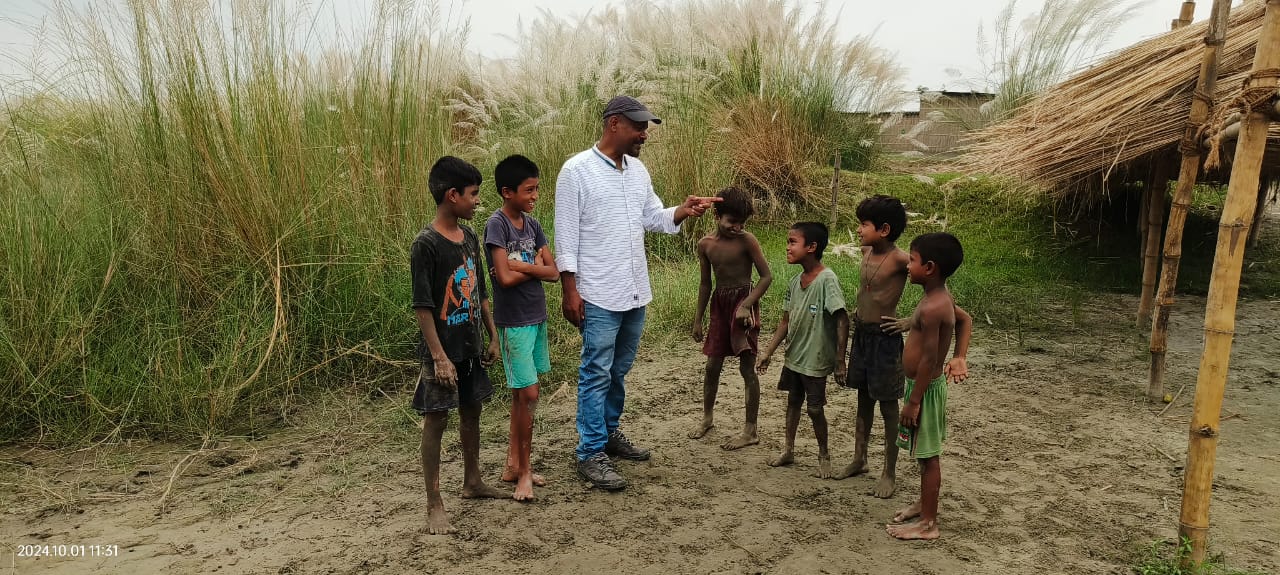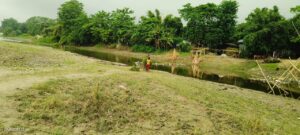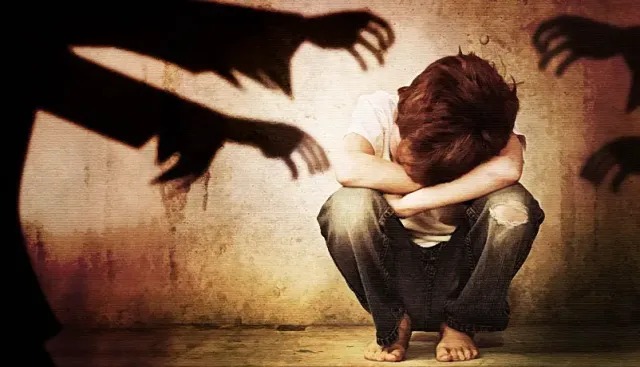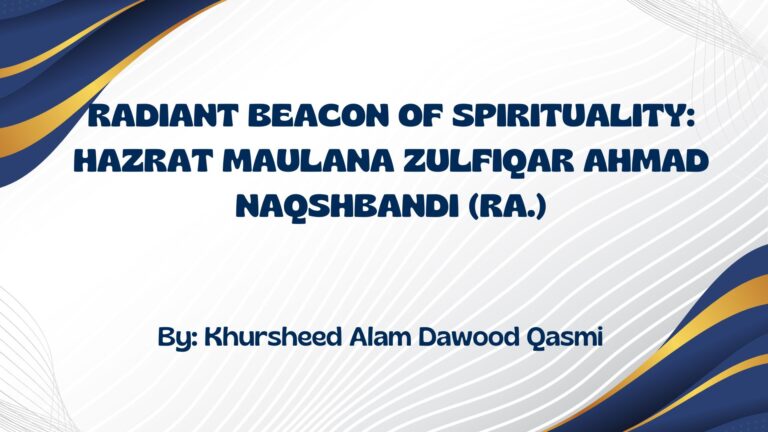
Evicted from Kochutoli near Guwahati, Kids Drop Out, Take to Grazing to Support Family
Evicted from Kochutoli near Guwahati, Kids Drop Out, Take to Grazing to Support Family
Rafiqul Islam
A Child Activist
The carefree laughter of children playing barefoot on the soil of a char (sandbar) of Barpeta, across a small canal of Brahmaputra, masks a deeper issue. Despite their apparent joy, the reality of their education is disputed at best. While some children started playing having returned from their morning exams at a school located beyond the canal, others, like Nasir, an 11-year-old armed with a sickle and rope, remained absent from the classroom.
His daily reality revolves around collecting grass to sell in the local market, trading his childhood for the opportunity to provide for his family. His father, Ali, a simple farmer had tried his hand at sharecropping, but failed for three consecutive years due to unpredictable weather and poor soil conditions. With their capital depleted, Ali left home to search for work, leaving Nasir to take care of his younger siblings and ailing mother. School, once a distant possibility for Nasir, has become an unattainable luxury.
This tragic tale is not unique to Nasir. In the riverine regions of Assam, where families scrape by amidst geographical isolation and poor infrastructure, children are often forced to leave school to support their families. Economic hardships and the lack of educational resources conspire to push these children into labour, with boys like Nasir becoming breadwinners, while many girls are forced into child marriages.
The journey to school for children living in these remote areas is arduous. Crossing canals without proper roads or bridges, and attending schools that often lack basic supplies, take a toll on even the most determined students. For others, like Nasir, survival needs conceal the idea of education altogether. The lush, scenic backdrop of Guma starkly contrasts with the harsh struggles faced by its young inhabitants, whose education and future prospects fade as they assume the burden of adult responsibilities far too early.

These hardships are magnified in cases of forced evictions, as seen in the plight of Zakir, a 14-year-old boy whose life is irreversibly altered by the eviction of Kochutoli, near Guwahati, in September 2024. Kochutoli eviction is infamous as it led to brutal killing of four and injury of about two hundred people by armed forces instilling a shiver of terror among the Muslim minority of Assam who are branded as outsider maliciously and without justification.
Children, once full of potential, are now left to fend for themselves, their dreams crushed under the weight of survival. Zakir had been attending school and living with his family in Kochutoli, a settlement that had been home for nearly three decades. However, when government authorities forcibly removed them from their land without proper warning or a plan for rehabilitation, their lives were thrown into chaos.
The eviction not only displaced families from their homes but disrupted every aspect of their existence. Education, which could have been a lifeline for children like Zakir, became an unattainable dream. Forced to seek refuge in a barren char – a desolate, sandy stretch of land that offers little in terms of resources or stability – Zakir was thrust into the role of provider, grazing animals and selling grass for a pittance just to keep his family afloat.
Zakir’s story underscores the far-reaching impact of such evictions. They do more than strip people of their homes – they strip them of their futures. For children, this means losing the chance to go to school, to learn, and to break free from the cycles of poverty that ensnare their families. For adults, it means losing not only their land but also their livelihoods, as they struggle to find work in unfamiliar, often inhospitable, environments.
The Kochutoli eviction is not an isolated incident. It is part of a broader pattern of forced displacement rooted in racial and ethnic discrimination in Assam. Many of those displaced from Kochutoli were from marginalized communities who had lived in the area for years, contributing to the local economy and culture. Yet, they were forced out without justifiable warning or offer of compensation. Their homes were demolished, their belongings scattered in the open, and their futures thrown into uncertainty. No effort was made to rehabilitate them or provide alternatives for housing, education, or employment.
Zakir’s family, along with many other families, migrated to various remote places in search of shelter, leaving behind everything they knew. But life on the remote areas is fraught with challenges, especially for the people with no belongings. The char life is that of an isolation which means access to healthcare, education, and employment is nearly non-existent. Zakir’s father, once a farmer, now struggles to find work, and his mother worn down by the trauma of displacement, remains ill.
For families like Zakir’s, survival takes precedence over everything, including education. Children who once had the potential to break free from the cycle of poverty through schooling are now forced into menial labour just to make ends meet. And without access to education, the future holds little hope for change.

These forced evictions, carried out without any regard for the well-being of the affected families, represent a gross violation of human rights. They leave behind a trail of devastation, particularly for children who are robbed of their right to an education. Without rehabilitation plans or policies aimed at ensuring the welfare of these displaced families, the cycle of poverty, disenfranchisement, and marginalization will only deepen.
In areas similar to Barpeta, where erosion from rivers like the Brahmaputra and Benki regularly displaces entire communities, the government’s failure to provide long-term solutions exacerbates the problem. Families, once displaced by natural forces, are further uprooted by authorities, forcing them into a state of constant instability. Zakir’s family had already faced displacement once, after losing their home to erosion on the river banks. Now, evicted from Kochutoli, they find themselves staring at the same river, wondering where they will go next.
These stories are representative of a broader global crisis, where vulnerable communities are pushed to the margins by governments and policies that fail to protect them. Forced evictions, driven by racial and ethnic discrimination, worsen poverty, inequality, and social fragmentation. The children who bear the brunt of these actions are denied the opportunity to learn, to grow, and to build better futures for themselves and their families.
Without intervention – without comprehensive policies that prioritize rehabilitation, education, and the well-being of displaced families – this crisis will continue. Children like Nasir and Zakir, who should be in classrooms learning, will instead be left to roam the fields with sickles and ropes, their futures slipping away like the waters of the Brahmaputra that erode their lands.
Evictions, when carried out without care or consideration, destroy more than homes – they destroy lives, futures, and the very fabric of society. For children like Nasir and Zakir, the consequences are especially severe, robbing them of their right to education and a chance at a better life. The global community must recognize the injustice of such actions and advocate for policies that protect the most vulnerable among us, ensuring that no child is left behind in the name of progress.
You May Also Like
 Breaking News
Breaking NewsIsrael’s confession of Killings of Palestinians! (War in the name of ceasefire, The Board of Peace is a Shield for Israel)
Israel’s confession of Killings of Palestinians! All talk of peace is just a lie...
 Children
ChildrenSilent Cries: Confronting Child Marriage under the Cloak of Tradition
Silent Cries: Confronting Child Marriage under the Cloak of Tradition Rafiqul Islam ...
 Articles
ArticlesChild Abuse, the Need for Legal Knowledge among Activists, and the Abuse of Power by Law Enforcement
Child Abuse, the Need for Legal Knowledge among Activists, and the Abuse of Power...
 Articles
ArticlesRadiant Beacon of Spirituality: Hazrat Maulana Zulfiqar Ahmad Naqshbandi (Rah.)
By: Khursheed Alam Dawood Qasmi First Acquaintance with Peer Sahib: It was around the...
 RELIGION
RELIGIONA Glance Over Major Religions of the World
A Glance Over Major Religions of the World By M. Burhanuddin Qasmi Director: Markazul Ma’arif...
 Children
ChildrenScholars Decide to Open Online English Medium Madrasa
(Press Release: Mumbai/ June - 5) On Saturday, the 3rd of June, 2023 Markazul...

Comments (1)
Leave a Comment
Real fantastic info can be found on website. "Politics is applesauce." by Will Rogers.